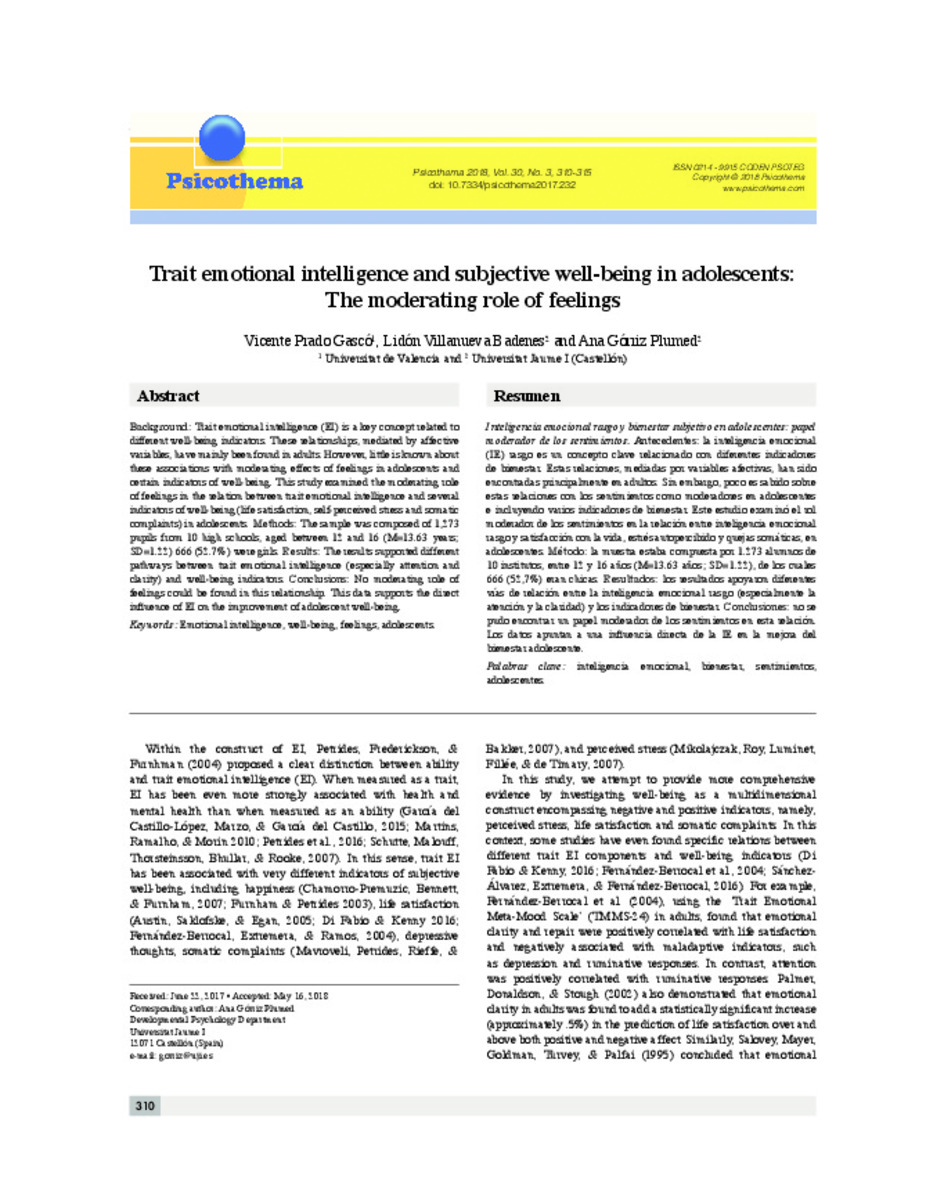Mostrar el registro sencillo del ítem
Trait emotional intelligence and subjective well-being in adolescents: The moderating role of feelings
| dc.contributor.author | PRADO-GASCO, VICENTE | |
| dc.contributor.author | Villanueva, Lidón | |
| dc.contributor.author | Górriz Plumed, Ana Belén | |
| dc.date.accessioned | 2018-10-24T11:18:21Z | |
| dc.date.available | 2018-10-24T11:18:21Z | |
| dc.date.issued | 2018 | |
| dc.identifier.citation | GASCÓ, Vicente Prado; BADENES, Lidón Villanueva; PLUMED, Ana Górriz. Trait emotional intelligence and subjective well-being in adolescents: The moderating role of feelings. Psicothema, 2018, vol. 30, no 3, p. 310-315. | ca_CA |
| dc.identifier.issn | 0214-9915 | |
| dc.identifier.issn | 1886-144X | |
| dc.identifier.uri | http://hdl.handle.net/10234/176989 | |
| dc.description.abstract | Background: Trait emotional intelligence (EI) is a key concept related to different well-being indicators. These relationships, mediated by affective variables, have mainly been found in adults. However, little is known about these associations with moderating effects of feelings in adolescents and certain indicators of well-being. This study examined the moderating role of feelings in the relation between trait emotional intelligence and several indicators of well-being (life satisfaction, self-perceived stress and somatic complaints) in adolescents. Methods: The sample was composed of 1,273 pupils from 10 high schools, aged between 12 and 16 (M=13.63 years; SD=1.22) 666 (52.7%) were girls. Results: The results supported different pathways between trait emotional intelligence (especially attention and clarity) and well-being indicators. Conclusions: No moderating role of feelings could be found in this relationship. This data supports the direct infl uence of EI on the improvement of adolescent well-being. | ca_CA |
| dc.description.abstract | Antecedentes: la inteligencia emocional (IE) rasgo es un concepto clave relacionado con diferentes indicadores de bienestar. Estas relaciones, mediadas por variables afectivas, han sido encontradas principalmente en adultos. Sin embargo, poco es sabido sobre estas relaciones con los sentimientos como moderadores en adolescentes e incluyendo varios indicadores de bienestar. Este estudio examinó el rol moderador de los sentimientos en la relación entre inteligencia emocional rasgo y satisfacción con la vida, estrés autopercibido y quejas somáticas, en adolescentes. Método: la muestra estaba compuesta por 1.273 alumnos de 10 institutos, entre 12 y 16 años (M=13.63 años; SD=1.22), de los cuales 666 (52,7%) eran chicas. Resultados: los resultados apoyaron diferentes vías de relación entre la inteligencia emocional rasgo (especialmente la atención y la claridad) y los indicadores de bienestar. Conclusiones: no se pudo encontrar un papel moderador de los sentimientos en esta relación. Los datos apuntan a una infl uencia directa de la IE en la mejora del bienestar adolescente. | ca_CA |
| dc.format.extent | 6 p. | ca_CA |
| dc.format.mimetype | application/pdf | ca_CA |
| dc.language.iso | eng | ca_CA |
| dc.publisher | Colegio Oficial de Psicólogos del Principado de Asturias | ca_CA |
| dc.relation.isPartOf | Psicothema 2018, Vol. 30, No. 3 | ca_CA |
| dc.rights.uri | http://rightsstatements.org/vocab/CNE/1.0/ | * |
| dc.subject | Emotional intelligence | ca_CA |
| dc.subject | well-being | ca_CA |
| dc.subject | feelings | ca_CA |
| dc.subject | adolescents | ca_CA |
| dc.subject | inteligencia emocional | ca_CA |
| dc.subject | bienestar | ca_CA |
| dc.subject | sentimientos | ca_CA |
| dc.subject | adolescentes | ca_CA |
| dc.title | Trait emotional intelligence and subjective well-being in adolescents: The moderating role of feelings | ca_CA |
| dc.title.alternative | Inteligencia emocional rasgo y bienestar subjetivo en adolescentes: papel moderador de los sentimientos | ca_CA |
| dc.type | info:eu-repo/semantics/article | ca_CA |
| dc.identifier.doi | https://doi.org/10.7334/psicothema2017.232 | |
| dc.relation.projectID | PSI2013-43943-R | ca_CA |
| dc.rights.accessRights | info:eu-repo/semantics/openAccess | ca_CA |
| dc.relation.publisherVersion | http://www.psicothema.com/psicothema.asp?id=4487 | ca_CA |
| dc.type.version | info:eu-repo/semantics/publishedVersion | ca_CA |
Ficheros en el ítem
Este ítem aparece en la(s) siguiente(s) colección(ones)
-
PSI_Articles [589]
Articles de publicacions periòdiques







